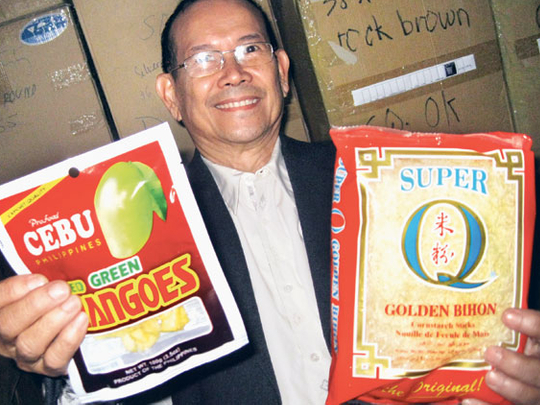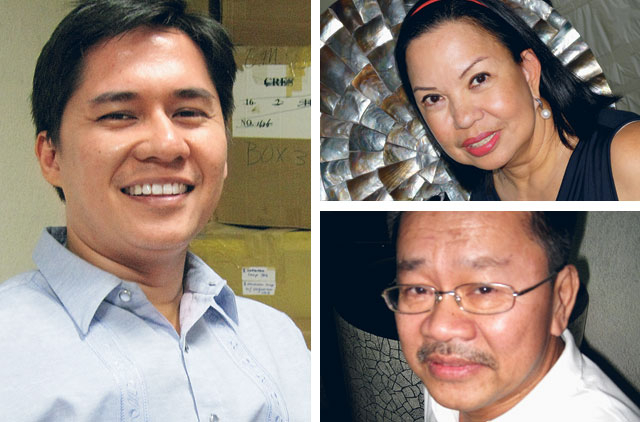
In what is believed to be a new trend, a small segment of Filipino nationals are leaving traditionally secure jobs in the United Arab Emirates after saving enough cash to start up small businesses, say members of the Philippine business community in Dubai.
Jojie Dinsay, Commercial Attache with the Philippine Embassy in the UAE said some Filipinos are looking beyond being a numbered employee at thousands of UAE companies to someday become their own boss. An estimated 500,000 Filipinos live and work in the UAE.
"We've traditionally been focused on employment and trade, entrepreneurship was never our main focus. But now we are doing seminars to promote small businesses," Dinsay said. "It's becoming an important aspect of our function. In the Philippines, small and medium enterprises (SMEs) businesses are the economic engine of the country."
"More and more Filipinos are becoming more interested in entrepreneurship in the UAE. We don't have any numbers as to how many yet, that's something we're working on."
Estimates suggested that 85 per cent of all businesses in the UAE are small-to-medium businesses.
Dinsay said the challenge is to maintain an extremely employable Filipino workforce in the UAE but to also support those who had plans to be more autonomous, as business leaders in their own right.
"We want to train Filipinos here to not just do well here in regular jobs, but also when they return to the country, they can start up businesses," Dinsay said.
"Hopefully, they can save enough capital here to start up small businesses. That will provide jobs, what we really need in the Philippines. That's why we are really pushing entrepreneurial spirit."
In 2010, the Philippine Embassy in Abu Dhabi is offering two types of entrepreneurial workshops: financial literacy, to instil the fundamentals of financial planning, managing funds and investments; and how to start a business with a focus on amassing capital start-up funds via a simple personal savings plan.
Dinsay said the idea is catching on with Filipinos of all ages approaching financial professionals for advice on how best to bank start-up capital needed to finance a fledgling small-to-medium enterprise (SME).
Philippine National Bank First Vice-President and Regional Representative for Mena Cheng Rasul said Filipinos didn't want a handout business loan. They preferred to save their money the old-fashioned way, by putting it in the bank, he said.
"There has been a trebling of these requests from Filipinos," Rasul told Gulf News. "We've seen a 15 per cent increase in deposits with us. They're saving as much as they can and after saving a certain amount, they want to invest in a small business."
Savings triple
Rasul said the increase in savings account requests had tripled by workers who were worried about their security while working for firms during recent economic hardship.
As layoffs occurred during the world recession in 2009, people started "saving more for uncertain times," he said.
"Most of the workers here want to go back to the provinces where they belong and start their own small businesses. But they don't have the money, that's why they're saving with us now," he said.
Rasul said a number of his clients had already returned to the Philippines with enough money to start small grocery stores, and other small businesses that catered to local markets, such as restaurants and laundry services.
"Some are buying land while working here in the UAE so that they can plant fruit and vegetables for their own businesses when they go home," Rasul said.
Lucille A. Ong, Chairman of the Philippines Business Council (PBC) in Dubai, said she was pleased to see the push of entrepreneurial spirit in her community.
Ong helped found the PBC in April 2001 and is also CEO of Unlimited Design, a company she founded after several years of owning her own fashion company.
The businesswoman said operating her own business had been extremely taxing, punctuated with long hours, but she recommended it for those who truly believed they could manage a new business.
"New small business owners in the Filipino community are still a small number but they are increasing," Ong said.
"It's a trend by people who are brave enough to venture out of the corporate environment. Because of the economic crisis, people realised you could get terminated at any moment."
Cash inflow
The Philippine Business Council is proud it has offered small-business courses for the past nine years which has led to some success stories in Dubai.
Ong noted that some who left reasonably sound jobs to start their own business said they found a "sense of freedom". But that had to be balanced with the acknowledgement that, as an owner and manager, "you are the bottom line".
"It's still your call at the end of the day. You have to be patient enough to knock on 10,000 doors and then only see 10 open. But those 10 can lead to endless possibilities," she said.
The shift from employee to employer is big considering that the longstanding tradition in the Philippines dictates that Filipinos migrate to other countries to work for secure higher-paying corporations.
Seeking work abroad has not traditionally been viewed as a stepping stone toward entrepreneurship, rather as a means of sending savings back home to workers' families to increase the quality of life.
For example, in 2009, the World Bank and the International Monetary Fund (IMF) made dire predictions that remittances to the Philippines from nationals working abroad would plummet by six per cent for the year.
Given the high degree of cash inflow into the country, it was also forecast that such a decline could sink the Philippines into deep recession.
The gloomy outlook, however, never materialised and more overseas Filipino workers were hired abroad, leading to a 5.6 per cent increase in savings sent home by workers.
Jennifer Jardin-Manalili, Administrator of the Philippine Overseas Employment Administration (POEA) group said: "As massive joblessness plagued the industrialised world and the countries that depended on its economy, we experienced a demand for overseas Filipino labour and international capital was repatriated home giving the Philippines an unprecedented increase in [Overseas Filipino Worker] remittances".
In the POEA annual report, Jardin-Manalili said that "average deployment grew to 3,897 [Overseas Filipino Workers] daily, generating an increase of 10.5 per cent in deployed new hires as well as a 15 per cent increase in rehires, the highest in OFW history".
"[Overseas Filipino Worker] remittances totalled an unprecedented $17.348 billion (Dh63 billion) for the year and contributed 9.5 per cent to the country's GDP, the report said."
Jardin-Manalili attributed the high demand for Filipino workers to their proven track record of being loyal, hard-working employees who were committed to their foreign employers while living abroad.
"We could only agree with economist Bernardo Villegas' observations that OFWs possess qualities not usually found in the average migrant worker from other developing countries," she said. "Filipinos are usually the first to be hired and the last to be fired. They are preferred over the rest not only because they are multi-talented and multi-skilled, or they easily learn new languages and adapt to different cultures but mainly because they do not shirk from work."
The driving force behind the Filipino work ethos was the want to send as much money home to build a better future for family, she said.
"Etched in the heart of every OFW is the duty and dedication to remit home their hard-earned income amidst economic dislocations that they face in their host country," said Jardin-Manalili. "They double-up on work, scrimp and save to improve the quality of life of their folks back home."
The POEA reported that the UAE recorded a large number of "new hires and rehires" of Filipino workers in 2009, adding to a Filipino expatriate population estimated to stand at around 500,000.
The POEA report stated that the UAE recorded a 1.6 per cent increase in new Filipino workers from 193,810 in 2008 to 196,815 in 2009.
By comparison, Saudi Arabia saw a 5.6 per cent jump in the same period with 291,419 Filipinos hired or rehired in 2009.
Globally in 2009, a "record 1.4 million overseas Filipino workers were deployed in 2009, a 15.1 per cent increase in OFW presence in more than 190 countries of destination" the report said.
Key priority of expatriate workers is to send cash home and ensure there is money in the bank for any emergencies. Many have an entrepreneurial spirit and are keen to set up their own businesses.
UAE ranks high for starting a business
According to the World Bank's Doing Business 2010 report, the UAE ranked high in the report's Ease of Doing Business category coming in at 33rd place among the 183 country economies studied.
The UAE climbed 14 notches in 2010 in the category, above its 2009 ranking of 47.
The report classified the UAE as a "high income" country that enjoyed a GNI per capita of $54,606.
Under the report's Starting a Business category, the World Bank said that setting up a new venture in the UAE required eight steps over 15 days and that the capital start-up cost required was 6.2 per cent of income per capita.
The UAE scored exceptionally high under the "paying taxes" category, ranking fourth out of 183 countries given there is no business or personal income tax to be paid in the country.
The UAE also scored well in the "trading across borders" with a fifth-place ranking worldwide.
activity
UAE enjoys budding confidence
The entrepreneurial spirit is alive and well in the UAE, according to the Global Entrepreneurship Monitor 2009 Global Report.
Released in January, the study suggested that despite declining new business start-ups last year, one third of the 54 countries — including the UAE — "showed increased activity" in the entrepreneurial business world.
The report placed the UAE in the innovation-driven category where "economies are characterised by their production of new and unique goods and services that are created via sophisticated and often pioneering methods".
GEM found that the UAE was experiencing a faster rate of "total early stage entrepreneurial activity (TEA)" than other countries in the innovation category.
TEA is described as the proportion or percentage of the population which was "setting up a business or owners-managers of new businesses".
"Among innovation-driven economies, the UAE and Iceland have the highest rates of TEA, with the United States only just making the top quartile," the report said.













